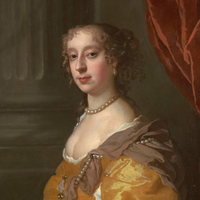Upon a Little Lady
Under the Discipline of an Excellent Person.
I.
How comes the Day orecast? the Flaming Sun
Darkn’d at Noon, as if his Course were run?
He never rose more proud, more glad, more gay,
Ne’re courted Daphne with a brighter Ray!
And now in Clouds he wraps his Head,
As if not Daphne, but himself were dead!
And all the little Winged Troop
Forbear to sing, and sit and droop;
The Flowers do languish on their Beds,
And fading hang their Mourning Heads;
The little Cupids discontented, shew,
In Grief and Rage one breaks his Bow,
An other tares his Cheeks and Haire,
A third sits blubring in Despaire,
Confessing though, in Love, he be,
A Powerful, Dreadful Deitie,
A Child, in Wrath, can do as much as he!
Whence is this Evil hurl’d,
On all the sweetness of the World?
Among those Things with Beauty shine,
(Both Humane natures, and Divine)
There was not so much sorrow spi’d,
No, not that Day the sweet Adonis died!
II.
Ambitious both to know the Ill, and to partake,
The little Weeping Gods I thus bespake.
Ye Noblest Pow’rs and Gentlest that Above,
Govern us Men, but govern still with Love,
Vouchsafe to tell, what can that Sorrow be,
Disorders Heaven, and wounds a Deitie.
My Prayer not spoken out,
One of the Winged Rout,
With Indignation great,
Sprung from his Airie-Seat,
And mounting to a Higher Cloud,
With Thunder, or a Voice as loud
Cried, Mortal there, there seek the Grief o’th’ Gods,
Where thou findst Plagues, and their revengeful Rods!
And in the Instant that the Thing was meant,
He bent his Bow, his Arrow plac’t, and to the mark it sent!
I follow’d with my watchful Eye,
To the Place where the Shaft did flie,
But O unheard-of Prodigy.
It was retorted back again,
And he that sent it, felt the pain,
Alas! I think the little God was therewith slain!
But wanton Darts ne’re pierce where Honours found,
And those that shoot them, do their own Breasts wound.
III.
The Place from which the Arrow did return,
Swifter then sent, and with the speed did burn,
Was a Proud Pile which Marble Columnes bare,
Tarrast beneath, and open to the Aire,
On either side, Cords of wove Gold did tie
A purfl’d Curtain, hanging from on high,
To clear the Prospect of the stately Bower,
And boast the Owners Dignity and Power!
This shew’d the Scene from whence Loves grief arose,
And Heaven and Nature both did discompose,
A little Nymph whose Limbs divinely bright,
Lay like a Body of Collected Light,
But not to Love and Courtship so disclos’d,
But to the Rigour of a Dame oppos’d,
Who instant on the Faire with Words and Blows,
Now chastens Error, and now Virtue shews.
IV.
But O thou no less Blind,
Than Wild and Savage Mind,
Who Discipline dar’st name,
Thy Outrage and thy shame,
And hop’st a Radiant Crown to get
All Stars and Glory to thy Head made fit,
Know that this Curse alone shall Serpent-like incircle it!
May’st thou henceforth, be ever seen to stand,
Grasping a Scourge of Vipers in thy Hand,
Thy Hand, that Furie like—But see!
By Apollos Sacred Tree,
By his ever Tuneful Lyre,
And his bright Image the Eternal Fire,
Eudoras she has done this Deed
And made the World thus in its Darling bleed!
I know the Cruel Dame,
Too well instructed by my Flame!
But see her shape! But see her Face!
In her Temple such is Diana’s Grace!
Behold her Lute upon the Pavement lies,
When Beautie’s wrong’d, no wonder Musick dies!
V.
What blood of Centaurs did thy Bosom warme,
And boyle the Balsome there up to a Storme?
Nay Balsome flow’d not with so soft a Floud,
As thy Thoughts Evenly Virtuous, Mildly Good!
How could thy Skilful and Harmonious Hand,
That Rage of Seas, and People could command,
And calme Diseases with the Charming strings,
Such Discords make in the whole Name of Things?
But now I see the Root of thy Rash Pride,
Because thou didst Excel the World beside,
And it in Beauty and in Fame out-shine,
Thou would’st compare thy self to things Divine!
And 'bove thy Standard what thou there didst see,
Thou didst Condemn, because ’twas unlike thee,
And punisht in the Lady as unfit,
What Bloomings were of a Diviner Wit.
Divine she is, or else Divine must be,
A Borne or else a Growing Deitie!
VI.
While thus I did exclaime,
And wildly rage and blame,
Behold the Sylvan-Quire
Did all at one conspire,
With shrill and cheerful Throats,
T’assume their chirping Notes;
The Heav’ns refulgent Eye
Dance’t in the clear’d-up Skie,
And so triumphant shon,
As seven-days Beams he had on!
The little Loves burn’d with nobler fier
Each chang’d his wanton Bow, and took a Lyre,
Singing chast Aires unto the tuneful strings,
And time’d soft Musick with their downy Wings.
I turn’d the little Nymph to view,
She singing and did smiling shew;
Eudora led a heav’nly strain,
Her Angels Voice did eccho it again!
I then decreed no Sacriledge was wrought,
But neerer Heav’n this Piece of Heaven was brought.
She also brighter seem’d, than she had been,
Vertue darts forth a Light’ning 'bove the Skin.
Eudora also shew’d as heretofore,
When her soft Graces I did first adore.
I saw, what one did Nobly Will,
The other sweetly did fulfil;
Their Actions all harmoniously did sute,
And she had only tun’d the Lady like her Lute.

